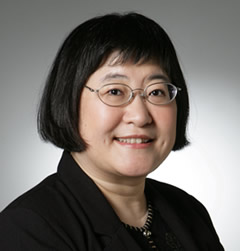

| Born in 1953 in Guangzhou,
China, the daughter of two physicians, in a home filled with classical
music, Chen Yi studied violin and piano from the age of three. During
the difficult time of the Cultural Revolution in the 1960’s, she was
sent into forced labor in the countryside for two years, working twelve
hours a day building military fortifications, and separated from her
family. But she managed to take her instrument along, and credits this
experience with providing her with knowledge of the wider life and
music of her motherland and its people. At the age of 17, she returned to her home city and served as concertmaster and composer with a traditional Beijing Opera Troupe, and also began her research of Chinese traditional music and Western classical music theory under the supervision of Zheng Zhong. When the school system was restored in 1977, Chen enrolled in the Beijing Central Conservatory, where she studied composition under Professor Wu Zu-qiang and British guest composer Alexander Goehr. She continued her violin studies with Professor Lin Yao-ji and began an eight-year systematic study of Chinese traditional music. She earned her BA and MA degrees in Beijing, the first woman in China to receive the degree of Master of Arts in composition. In 1983, she went to the United States for further study, and in 1993 received her Doctor of Musical Arts with distinction from Columbia University, where her composition teachers were Chou Wen-chung and Mario Davidovsky. That year, with support from Meet the Composer, she was appointed Composer-in-Residence with the Womens’ Philharmonic, Chanticleer, and the Aptos Creative Arts Center in San Francisco. From 1996-1998, she was on the composition faculty of the Peabody Institute of the Johns Hopkins University. Chen Yi was elected to the American Academy of Arts and Sciences in 2005. Among the many other awards she has received are: the Charles Ives Living Award from the American Academy of Arts and Letters, a Guggenheim Fellowship, the Lieberson Award of the American Academy of Arts and Sciences, an ASCAP Concert Music Award, first prize at the Chinese National Composition Competition, the Lili Boulanger Award, the Sorel Medal for Excellence in Music from the Center for Women in Music at New York University, the CalArts Alpert Award for music, the first Eddie Medora King Composition Prize from the University of Texas at Austin School of Music, the Elise Stoeger Award from the Chamber Music Society of Lincoln Center, the Friendship Ambassador Award from the Edgar Snow Fund, an Honorary Doctorate from Lawrence University, an Adventurous Programming Award from ASCAP, and the Kauffman Award in Artistry/Scholarship from UMKC. Her long list of commissions include: the NEA, the Mary Flagler Cary Charitable Trust, the Fromm Music Foundation at Harvard University, the Koussevitzky Foundation, the Creative Work Fund, the Ford Foundation, the Rockefeller Foundation, The Roche Commissions, the Barlow Endowment, the New Heritage Music Foundation, American Composers Forum, the Eastman School of Music, Ithaca College, Peoria University, Bradley University, Miami University, Friends of Dresden Music Foundation, Chorus America, the 6th World Symposium on Choral Music, the Lucerne Music Festival, Carnegie Hall, American Guild of Organists, the Copland Fund for Music, Chamber Music America, the San Francisco Art Commission, the NYSCA, and the Meet the Composer. Performers and ensembles for whom she has written include the Cleveland, Dresden and the New York Philharmonic Orchestras, the Orchestra of St. Luke’s, the BBC Symphony Orchestra, the Seattle Symphony, Yo-Yo Ma and the Pacific Symphony, Rascher Saxophone Quartet and the Stuttgart Chamber Orchestra, Yehudi Menuhin, Emanuel Ax, Evelyn Glennie and the Singapore Symphony, the St. Paul Chamber Orchestra, The Women’s Philharmonic, the Brooklyn Philharmonic, the Metropolitan Wind Symphony, Philadelphia Classical Symphony, the Los Angeles Philharmonic, the Chamber Music Society of Minnesota, New Music Consort, San Francisco Contemporary Music Players, Chanticleer, KITKA, San Francisco Citywinds, the San Francisco Girls Chorus, Music From China, the Ying Quartet, the Elements Quartet, the Shanghai Quartet, the Maryland Classic Youth Orchestra, the HK Chinese Orchestra, Boston Musica Viva, Network For New Music, Opus 21, Chicago a cappella, KC Chorale, Peninsula Women’s Chorus, and many others. Dr. Chen’s music is performed worldwide and published by the Theodore Presser Company. Her works have been recorded on many labels. She continues to be active as a violinist in new music and as an ethnomusicologist in Chinese music and is co-editor of the Music From China Newsletter, an English and Chinese bilingual publication, introducing Chinese music, both traditional and contemporary, to wider audience and scholars. Chen Yi is in great demand as a lecturer at composition workshops and at concerts of her music throughout the world. She was appointed by the China Ministry of Education to the prestigious three-year Changjiang Scholar Visiting Professorship at the Beijing Central Conservatory of Music in 2006, and presently serves on the boards, advisory councils or juries of Meet The Composer, Chamber Music America, the Fromm Music Foundation at Harvard University, the Guggenheim Memorial Foundation, American Composers Orchestra, the American Society of Composers, Authors and Publishers, the National Endowment for the Arts, and the International Alliance of Women in Music, as well as numerous other music organizations. -- Names which are links on this webpage
refer to my Interviews elsewhere on my website. BD
|
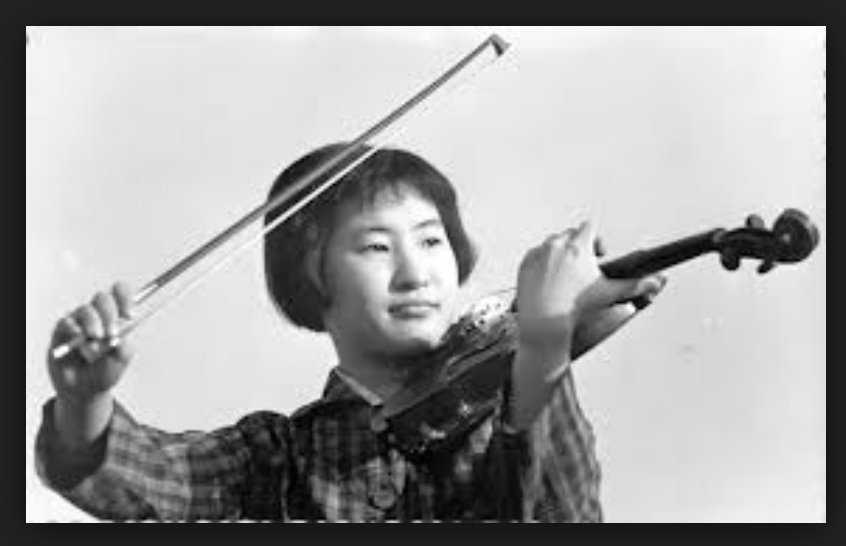
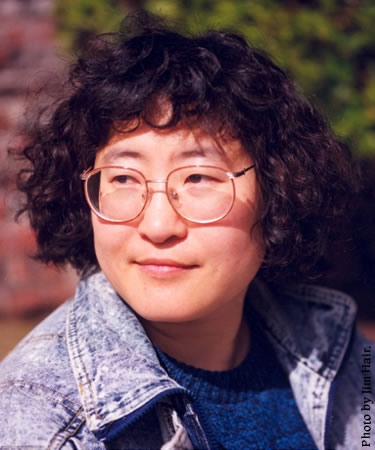 CY: Yes, and
also percussion instruments are
included. Then after the training, we went to the countryside to
collect folk songs. Two years of hardship, like a
working in the countryside, educated me a lot with the basic
language. There is my native language that the farmers
spoke. Actually it’s the first time for me to realize that
this is my native language! It’s not classical. It’s not
Mozart! [Both laugh] It’s not Beethoven that I’m used
to. Then I started to realize that I should find my own
voice. After all this working a patch of ground, hard working
with farmers,
living together and going to mountains, I
realized that I have to think into my cultural roots very deeply in
order to find my own voice, to have a unique language to speak in.
CY: Yes, and
also percussion instruments are
included. Then after the training, we went to the countryside to
collect folk songs. Two years of hardship, like a
working in the countryside, educated me a lot with the basic
language. There is my native language that the farmers
spoke. Actually it’s the first time for me to realize that
this is my native language! It’s not classical. It’s not
Mozart! [Both laugh] It’s not Beethoven that I’m used
to. Then I started to realize that I should find my own
voice. After all this working a patch of ground, hard working
with farmers,
living together and going to mountains, I
realized that I have to think into my cultural roots very deeply in
order to find my own voice, to have a unique language to speak in.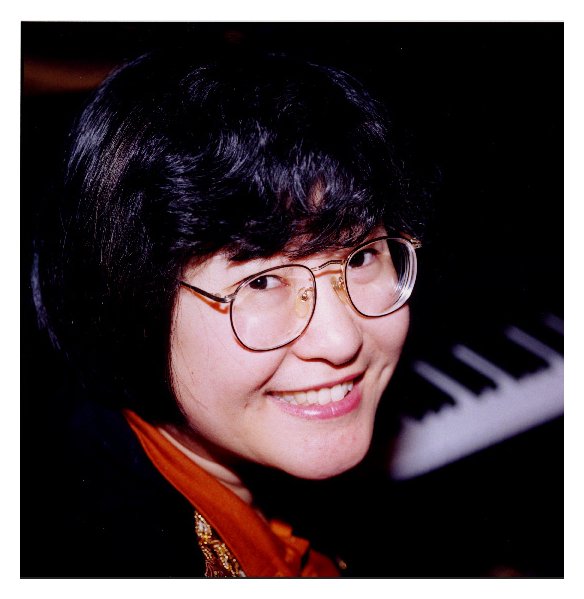 BD: Do the
Western audiences know enough of your
language to be able to enjoy and understand your music?
BD: Do the
Western audiences know enough of your
language to be able to enjoy and understand your music?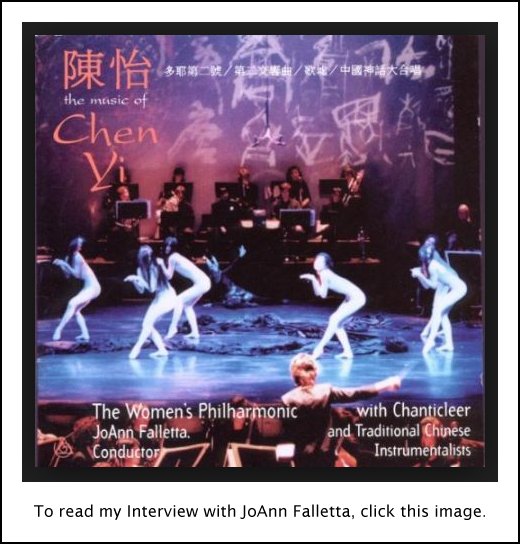 BD: But you
want your music to be more than just
useful, don’t you?
BD: But you
want your music to be more than just
useful, don’t you?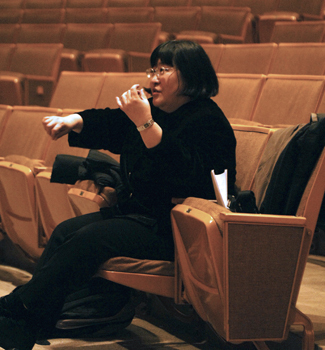 CY: I really
love working with young
composers. That this is the most inspiring thing for me in
my life. For my students, I would urge them to
find their own voices. That’s why they have to go and do
research.
They should see what is their cultural background and what is
their direction to go for their whole life, although this
direction could be flexible sometimes, because as you grow up, you
change your language. But that would be still your
background. Your
root would never be changed because you grew up in this culture.
You
have to dig deeply into it to find out what’s the most comfortable
language for you to speak in to share with
others. Those are the important things — to
go to society,
to love people around you, to love the society. You really go to
work hard in the society, for others, for the culture, for the future.
CY: I really
love working with young
composers. That this is the most inspiring thing for me in
my life. For my students, I would urge them to
find their own voices. That’s why they have to go and do
research.
They should see what is their cultural background and what is
their direction to go for their whole life, although this
direction could be flexible sometimes, because as you grow up, you
change your language. But that would be still your
background. Your
root would never be changed because you grew up in this culture.
You
have to dig deeply into it to find out what’s the most comfortable
language for you to speak in to share with
others. Those are the important things — to
go to society,
to love people around you, to love the society. You really go to
work hard in the society, for others, for the culture, for the future.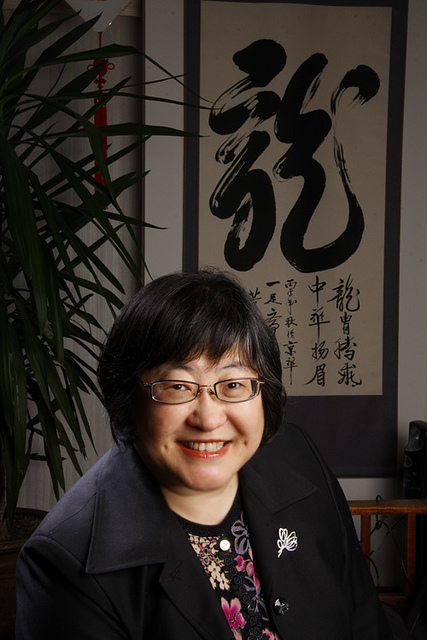 BD: That is a
very nice way of looking at it. Tell me about your name.
BD: That is a
very nice way of looking at it. Tell me about your name.This interview was recorded at the Congress Hotel in Chicago on
December 14, 2005. Portions
were used (with recordings) on WNUR twice in 2006 and 2008. A
copy was also given to the Oral
History of American Music archive at Yale University. This
transcription was made and posted on this
website in 2013.
To see a full list (with links) of interviews which have been transcribed and posted on this website, click here.
Award - winning broadcaster Bruce Duffie was with WNIB, Classical 97 in Chicago from 1975 until its final moment as a classical station in February of 2001. His interviews have also appeared in various magazines and journals since 1980, and he now continues his broadcast series on WNUR-FM, as well as on Contemporary Classical Internet Radio.
You are invited to visit his website for more information about his work, including selected transcripts of other interviews, plus a full list of his guests. He would also like to call your attention to the photos and information about his grandfather, who was a pioneer in the automotive field more than a century ago. You may also send him E-Mail with comments, questions and suggestions.